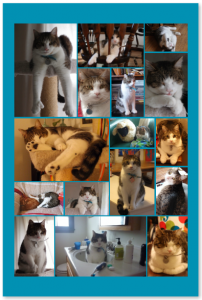On New Year’s Eve we watched The Sound of Music, a movie I watched a lot as a kid but probably hadn’t seen a single time since then.
Things I didn’t understand about the movie as a child:
Why someone as old as the Captain would be looking for a new wife, or why he would be attractive to Maria in any way.
Why the Captain would be cold and emotionally damaged with his children, which I understood was because he was broken by the death of his wife—but then be relaxed and warm and happy with the Baroness and Max. “The children remind him of his wife” seemed inadequate explanation.
The appeal of the Baroness.
Why my mother kept making remarks about how Liesl is more like 29 going on 30.
Why my mother was so annoyed by the near-instant transformation of the terrible naughty children into perfect delightful ones.
Why my mother (a former teacher) was annoyed by the children’s instant and full grasp of the principals and applications of music. Teaching is easy! All you have to do is explain it once and demonstrate it once and that’s all there is to it! Instant gifted musicians!
Why Rolfe is suddenly cold to Liesl after being so sweet to her before.
Alllllllll the Germany/Nazi stuff.
Why singing Eidelweiss at the festival was a big deal, and why the Captain choked up.
Who on earth Max was, and why was he THERE?
Things I didn’t understand about the movie as an adult:
Why the Captain called Maria repetitious in her request for play clothes for the children, when it was her first time asking. (Theory: cut scenes.)
Why the Captain would be cold and emotionally damaged with his children, which I understood was because he was broken by the death of his wife—but then be relaxed and warm and happy with the Baroness and Max. “The children remind him of his wife” seems inadequate explanation.
Why the family hides in the nunnery and then goes out the back door, instead of going out the back door to begin with, or else staying in hiding until the soldiers leave.
Why Liesl’s dress is SO DIRTY when she comes in from the rain. (Paul says “from climbing the side of the house,” but it’s also dirty all over the back.) (Theory: unexpected fabric complications; dyes running, multiple-take mishaps, or whatnot.)
Why Maria gives Liesl something of her own to change into, instead of going (or having Liesl go) to her room to get something of Liesl’s own.
Where Maria’s “he can’t take his eyes off you in that” dress comes from: she didn’t make it from the fabrics she was given, and it’s not something she brought with her.
Why Liesl is not a teenager, but instead a grown woman talking in a breathy baby voice.
Why a nun sings the song about having adventures and following your dreams.
How Maria can be so relentlessly, amazingly perfect in every way, never a single moment of not wanting to fully interact with all those children, never a sharp word or moment of impatience. Just boundless, delightful energy and love, always knowing the right thing to say and do, always interested in teaching and playing and having fun. And the children respond by being absolutely perfect and delightful, and never mouthing off or misbehaving or being cranky, and hanging lovingly on her every word. The teenager consults her for advice, then takes it, then offers words of love and appreciation. DID NO ONE WORKING ON THIS FILM KNOW ANY ACTUAL CHILDREN?
Who on earth Max was, and why was he THERE?
I certainly felt differently about Christopher Plummer’s appeal this time around. Also, the Baroness was a more understandable character to me. As a child, I saw her not only as old but as obviously boring and unpleasant (doesn’t want to PLAY??? not charmed by someone else’s seven children??? obviously she is completely without merit), but as an adult I saw her as charming and pretty, with an understandable desire not to toss a ball around. I appreciated the way the Captain and the Baroness had a warm and affectionate and flirty relationship: I’d expect a movie of this sort to show their relationship as a burden of duty to the Captain and clearly a terrible idea, rather than something that would have been fine.
As for the perfection of Maria, while I was looking at information about the movie and the von Trapp family, I found this:
Far from the sweet and demure woman depicted in the film, Maria von Trapp recalls her stepmother Maria as being moody and prone to outbursts of manic rage. “[She] had a terrible temper. . . . And from one moment to the next, you didn’t know what hit her. We were not used to this. But we took it like a thunderstorm that would pass, because the next minute she could be very nice,” she stated in a 2003 interview.
I immediately felt much more as if Maria were a real person.
I’d forgotten how FUNNY the movie was. I’d remembered liking the songs, but I’d forgotten all the witty dialogue, physical humor, funny facial expressions, etc.
Well! Most of us liked it, and I suspect we’ll watch it again next New Year’s Eve.


















